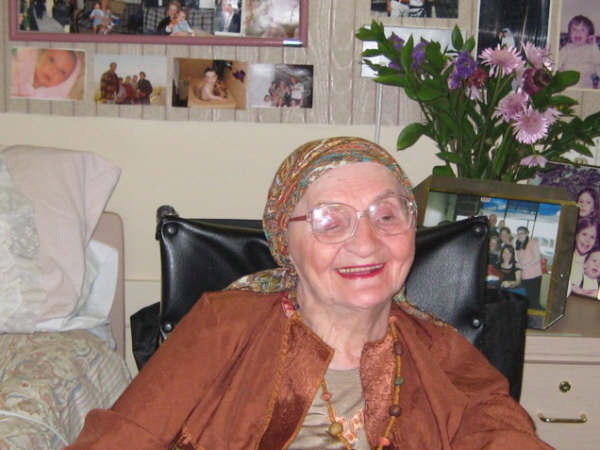A survivor’s tale
Woodmere Rehab resident Esther Bauman tells her story
By Malka Eisenberg
Issue of Sept. 26, 2008
On a warm fall day, Esther Bauman, 92, sits behind the tray of her wheelchair in her first floor room at the Woodmere Rehabilitation and Health Care Center, eating a sugar kichel. The walls covered with family photos, and the brightly colored sheets and curtains on the windows reveal no trace of her past in the Bergen Belsen concentration camp.
“You cannot talk about it,” Bauman says of her life during the war. “Every person has some good things and some bad things. Hitler was a bad thing. He ruined my life. Whatever I did he took away. I started a new life.”
Following the war, Bauman married Isak, a fellow survivor, and gave birth to two children, Florence and Jacob. Today, she is the proud matriarch of nine grandchildren and 28 great-grandchildren, living in Orthodox Jewish communities in Israel and the U.S. But in addition to her thriving family, Bauman’s legacy includes her experience working as an assistant teacher in a yeshiva for 42 years.
Though Bauman prefers to keeps her war and pre-war memories locked inside, Florence was able to piece together some of her mother’s story over the years. Bauman was born in 1916 in Lodz, Poland, one of 12 children. She had been married before the war; her husband, a son, her parents and siblings were all killed. She worked in several labor camps and was in Bergen Belsen from 1944 until liberation in 1945. During that time, plagued by hunger, she was caught stealing a loaf of bread; as a punishment, her remaining hair was shorn and she was beaten until one cornea was damaged and the other eye blinded.
Bauman met Isak, her second husband and also a war widower, in a displaced persons camp after the liberation. They married in November 1945. Jacob was born in September 1946 and Florence was born in February 1948, both in the DP Camp. After deciding not to go to Israel, fearing another war, the family waited six years before they moved to America, settling in the Bronx, without family or friends. Initially, they sent Jacob to yeshiva, but Florence was enrolled in public school. After she complained at age nine, her mother agreed to send her to yeshiva, even though they could not afford the tuition. To help cover the cost, they sold raffles, collected money in a “pushka” and worked at the school bazaars and bingo.
Bauman began her affiliation with Beth Jacob Beth Miriam in the Bronx in 1958 and continued working there after Florence’s graduation in 1961. She worked as an assistant teacher for three and four year olds in the preschool. During her time there, she often gave up a percentage of her salary to pay back the yeshiva for taking her daughter when the family could not afford it. Her father struggled to earn a living, first working in and later owning a grocery store in the Bronx.
Florence recalled the infamous “fish in the bathtub” with her mother holding the furiously wriggling fish above her and her brother’s heads to “shlug kaporos” with it, not long after ground and cooked into gefilte fish. She also recalls the countless packages of kreplach that Bauman cooked for weeks, traveling by train from the Bronx to deliver them to family.
Florence visits her Mom often and converses with her, talking loudly into her right ear, alternating between Yiddish and English.
“I had a good cry today for happiness,” Bauman told her daughter. “It is very hard to understand for you because you did beautiful things in your life for your parents.”
Florence recounted that when she was engaged to her husband, David, her mother said, “Do you see how good G-d is? He took away one David and now he’s giving me back a David,” referring to the baby that was taken from her in the Holocaust.
“G-d gave me a good son-in-law,” Bauman said of David, noting that he makes everything beautiful. “ I never dreamed that I would have one like that.”






